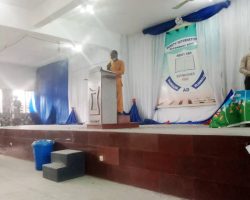Alumni Magazine
Mobilization Awards
To increase the membership of DIAA, the Membership Drive Committee introduced four award categories.
These awards inspire and recognize alumni who contribute to the growth of our association.
Class Champion
The member who, in a period of three months starting from July 2025, mobilizes the highest number of their ex-classmates to register with DIAA.
Rewards for Class Champion
1. Featured on the alumni website for three months (Name, photo, graduation year, career achievements)
2. DIAA Certificate of Achievement
3. Priority consideration for DIAA committee roles
4. Early access to DIAA events
5. Honourable mention during Zoom meetings
Alumni Champion
The member who, in one year starting from July 2025, mobilizes the highest number of Dority alumni, regardless of graduation year, to register with DIAA.
Rewards for Alumni Champion
1. Featured on the alumni website for one year (Name, photo, graduation year, career achievements)
2. DIAA Achievement Plaque
3. Letter of recognition signed by the DIAA President
4. Special Alumni Champion badge to be worn at DIAA events
5. Interview with the alumni magazine
6. Opportunity to name a DIAA program
7. Priority consideration for DIAA leadership roles
8. VIP seat at DIAA events
9. Subsidized transportation to DIAA reunion
10. Speaking slot at DIAA reunion
Set of the Year
The graduating class with the highest number of registered alumni in a year, starting from July 2025.
Rewards for Set of the Year
1. Class photo featured on the alumni website for one year
2. Set of the Year badges to be worn at DIAA events
3. VIP table at reunion
4. Set of the Year banner at DIAA reunion
5. Set of the Year cake at DIAA reunion
Set of Excellence
The graduating class with the highest percentage of ex-classmates registered in one year, starting from July 2025.
It is calculated as: (Number of Registered Ex-Classmates)÷(Estimated Total Class Size)×100.
Rewards for Set of Excellence
1. Set of Excellence certificate featured on the alumni website for one year
2. VIP table at DIAA reunion
3. Set of Excellence badges to be worn at DIAA events
4. Priority access to alumni t-shirts and souvenirs
5. Surprise gift for a randomly picked member of the set at DIAA reunion
Pioneer Set Presents Basketball Equipment to Dority
On Saturday, October 23, 2021, members of Dority International Alumni Association, Class of 1997, presented basketball equipment to Dority International Early Learning School (previously known as Dority International Secondary School).
The equipment was presented during the school’s SS3 graduation ceremony.
Engr Emole Kalu Onumah delivered the opening remarks of the graduation and the Chairman, Pioneer Set, Engr Okey Onye gave a keynote speech on how to succeed at the next level.
The proprietress, Mrs Zovannah Onumah, and the Secondary School Coordinator, Mr Bright Adawisi, received the sports equipment from Engr Okey Onye, and the Secretary, Pioneer Set, Mr Ikenna Ohiaeri.
Below are pictures from the event and a thank you letter from Mrs Zovannah Onumah.

Mrs Zovannah Onumah’s Thank You letter
The Pioneer Students
Class of 1997
Dear Sirs/Madams,
The management, staff and students of Dority International Early Leaming School wish to thank you for your donation of tile basketball equipment to the school.
This will go a long way in improving our sporting activities as many students are interested in playing basketball.
We are very appreciative of this very thoughtful and kind gesture. We are happy that you still have the interest of your alma mater at heart and also made effort to reach out to us In this manner.
We are very proud of you. Thank you once again!
Sincerely,
Mrs Zovannah Onumah (PRINCIPAL)







